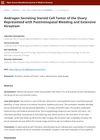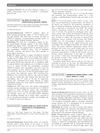2 citations,
July 2022 in “Journal of the Endocrine Society” Some women with PCOS have rare genetic variants linked to the condition.
 1 citations,
July 2023 in “Frontiers in Immunology”
1 citations,
July 2023 in “Frontiers in Immunology” Oxidative stress and immune dysfunction are linked to both Hashimoto's thyroiditis and polycystic ovary syndrome, with diet and specific treatments important for managing these conditions.
 1 citations,
February 2017 in “Journal of gynecology and womens health”
1 citations,
February 2017 in “Journal of gynecology and womens health” The document concluded that more research is needed to understand how estrogen affects the enzyme involved in hirsutism development.
 August 2024 in “EMJ Dermatology”
August 2024 in “EMJ Dermatology” Non-scarring alopecia in females affects emotional well-being and requires accurate diagnosis and personalized treatment.
 April 2024 in “JCEM case reports”
April 2024 in “JCEM case reports” A woman's rare benign tumor that released both cortisol and testosterone was successfully removed, improving her health.
 October 2023 in “IntechOpen eBooks”
October 2023 in “IntechOpen eBooks” Genes and epigenetic changes are important in the development of Polycystic Ovary Syndrome.
 January 2023 in “Open Journal of Endocrine and Metabolic Diseases”
January 2023 in “Open Journal of Endocrine and Metabolic Diseases” Hyperandrogenism is a common hormonal disorder in women, often linked to PCOS.
 December 2022 in “Journal of Medical Case Reports”
December 2022 in “Journal of Medical Case Reports” A 20-year-old woman was found to have a rare ovarian tumor causing symptoms like acne and a low-pitched voice, which disappeared after the tumor was removed.
November 2020 in “Case reports in endocrinology” Removing one ovary helped treat a woman's severe PCOS symptoms when medicine didn't work.
November 2020 in “AACE clinical case reports” A woman's severe male hormone excess was caused by a small, hard-to-find ovarian tumor.
 December 2013 in “Open Access Macedonian Journal of Medical Sciences”
December 2013 in “Open Access Macedonian Journal of Medical Sciences” A woman's excessive hair growth and high testosterone were caused by a rare ovarian tumor, which was successfully treated with surgery.
September 2022 in “Dermatology and therapy” Androgenetic alopecia is linked to heart disease, metabolic issues, and mental health problems.
January 2020 in “International Journal of Trichology” Androgen-producing ovarian tumors can cause male-pattern hair loss in women.
 99 citations,
December 2010 in “Journal of The European Academy of Dermatology and Venereology”
99 citations,
December 2010 in “Journal of The European Academy of Dermatology and Venereology” The document concludes that certain genetic mutations and dietary factors are involved in acne development, and treatments like isotretinoin and diet changes can help manage it.
 96 citations,
February 2007 in “The Journal of Clinical Endocrinology & Metabolism”
96 citations,
February 2007 in “The Journal of Clinical Endocrinology & Metabolism” Women with type 1 diabetes often have polycystic ovary syndrome and excess male hormones, which are frequently undiagnosed.
 42 citations,
February 1985 in “Journal of the American Academy of Dermatology”
42 citations,
February 1985 in “Journal of the American Academy of Dermatology” Excessive hair growth can be assessed by history, exam, and blood tests, and treated with medication like dexamethasone, birth control pills, and spironolactone.
 19 citations,
January 2007 in “Dermatology”
19 citations,
January 2007 in “Dermatology” Unwanted facial hair significantly impacts over 40% of women's psychological and social well-being, and various treatment options are available.
 October 2022 in “Miscellaneous”
October 2022 in “Miscellaneous” A rare, non-cancerous ovarian tumor was successfully treated with surgery, improving the patient's symptoms.
 34 citations,
April 2009 in “Expert Opinion on Pharmacotherapy”
34 citations,
April 2009 in “Expert Opinion on Pharmacotherapy” Some treatments work for common baldness, but there's less evidence for other hair loss types, and more research is needed.
 28 citations,
August 2014 in “Journal of Assisted Reproduction and Genetics”
28 citations,
August 2014 in “Journal of Assisted Reproduction and Genetics” The VEGF +405G allele may increase the risk of PCOS in South Indian women.
 27 citations,
April 2005 in “Journal of Chemotherapy”
27 citations,
April 2005 in “Journal of Chemotherapy” Some patients may experience temporary total hair loss from hepatitis C treatment with PEG-interferon and ribavirin.
 26 citations,
March 2014 in “Arquivos Brasileiros De Endocrinologia E Metabologia”
26 citations,
March 2014 in “Arquivos Brasileiros De Endocrinologia E Metabologia” The document concludes that proper diagnosis and combined treatments are key for hirsutism management, and weight loss may help overweight patients.
 18 citations,
June 2010 in “Current medicinal chemistry”
18 citations,
June 2010 in “Current medicinal chemistry” Treating hirsutism in women often requires a mix of medications and cosmetic methods for best results.
 14 citations,
July 1987 in “Contact Dermatitis”
14 citations,
July 1987 in “Contact Dermatitis” Minoxidil can cause allergic skin reactions in some users.
 195 citations,
May 2003 in “Obstetrics and gynecology (New York. 1953. Online)/Obstetrics and gynecology”
195 citations,
May 2003 in “Obstetrics and gynecology (New York. 1953. Online)/Obstetrics and gynecology” Most women with excess hair growth have an underlying hormonal issue, often treated with medication and hair removal methods.
 57 citations,
June 2018 in “Nutrients”
57 citations,
June 2018 in “Nutrients” Celiac disease can cause skin problems that may get better with a gluten-free diet.
 19 citations,
July 2007 in “Dermatologic clinics”
19 citations,
July 2007 in “Dermatologic clinics” Tailor treatments for vitiligo to patient needs for best results.
 16 citations,
January 2006 in “The Aging Male”
16 citations,
January 2006 in “The Aging Male” Hormone imbalances can cause skin diseases, and understanding these links is important for diagnosis and treatment.
 12 citations,
January 2004 in “Reproductive biomedicine online”
12 citations,
January 2004 in “Reproductive biomedicine online” Low-dose anti-androgen drugs and certain drug combinations are effective for hirsutism, and insulin sensitizers show promise, especially for those with polycystic ovarian syndrome.
 11 citations,
January 2004 in “Exogenous dermatology”
11 citations,
January 2004 in “Exogenous dermatology” Outside factors like grooming, chemicals, and the environment can damage hair and cause disorders.
























